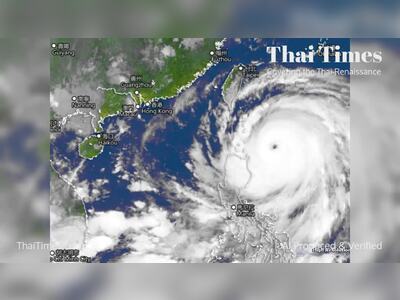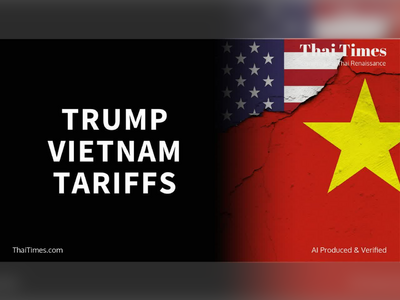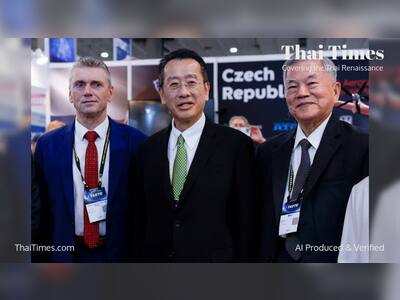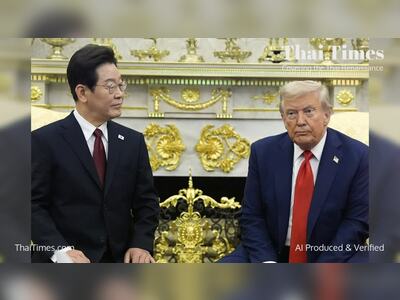Thailand Submits Revised Tariff Proposal to U.S., Open to Further Negotiations
The Thai government aims to facilitate bilateral trade with the United States through revised tariff proposals, including potential 0% import tariffs on select U.S. products.
Thailand has presented a revised tariff proposal to the United States as part of ongoing negotiations aimed at enhancing bilateral trade.
The proposal places a strong emphasis on expediting efforts to rebalance trade and reducing barriers to trade, according to government officials.
Pichai, a spokesperson for the Thai government, indicated that the discussions are currently focused solely on tariffs and product lists, with few countries having reached agreements with the U.S. so far.
He noted that an extension of the negotiation deadline may be considered until August 1, when further clarity on the remaining negotiations could be achieved.
Pichai highlighted that several areas still await review by U.S. authorities and added that Thailand has made additional proposals not directly related to tariff rates.
He mentioned that the agreement can evolve over time, allowing for further improvements.
When asked about the possibility of adopting Vietnam's strategy of implementing a 0% import duty, he emphasized the importance of open discussions regarding mutual interests and indicated that Thailand is reviewing its entire import list from the U.S.
Ensuring protection for domestic producers remains a priority, Pichai stated, in light of any agreements that may be reached.
Additionally, the issue of transshipped goods is being addressed separately, with ongoing cooperation between Thailand and U.S. officials, as the dialogue on this matter continues.
The Thai proposal has been updated to encompass a broader range of products eligible for potential 0% tariffs; however, not all items will fall under this category.
Pichai clarified that any concessions made would not disadvantage Thailand’s existing trading partners.
In assessing agricultural goods, there will be considerable scrutiny regarding which items are acceptable.
Pichai remarked on the positive reception of Thailand's proposal from the U.S. side while reiterating that it is too early to determine the specific tariff rates that may be agreed upon, particularly in comparison to Vietnam's arrangements.
He also addressed proposed tariffs of 10% on BRICS-related countries, stating further evaluation is necessary to understand the U.S. intentions and the implications for Thailand.
Finance Ministry Permanent Secretary Lavaron Sangsnit affirmed that Thailand's revised proposal aims to strengthen trade relations and balance trade more effectively between the two countries.
The proposal not only seeks to lower import duties but also to enhance imports from U.S. partners and encourage increased investment.
Lavaron highlighted that simply reducing tariffs may not lead to an improved trade balance; therefore, the proposal includes strategies to genuinely enhance trade and convey to the U.S. that Thailand is committed to addressing trade balance issues, acknowledging the significance of resolving non-tariff barriers that impede market access.
The revised proposal includes a focus on opening markets to U.S. agricultural and industrial products, alongside a clear commitment to procuring energy and aircraft from U.S. manufacturers.
Thailand is currently in discussions regarding significant long-term purchases of liquefied natural gas (LNG) from U.S. projects, specifically in Alaska, in addition to commitments from Thai chemical companies to expand imports of ethane from the U.S. Thai airlines are also planning to purchase additional Boeing aircraft.
Government spokesman Jirayu Huangsap conveyed the government's determination to shield Thailand's economy from adverse impacts resulting from U.S. tariff policies.
He indicated that the government, via Team Thailand, is actively engaging stakeholders domestically and in the U.S. to develop a comprehensive proposal aimed at mutual benefits.
Furthermore, the Thai government is preparing contingency measures to support businesses and farmers that might be affected by potential higher tariffs from the U.S.
The proposal places a strong emphasis on expediting efforts to rebalance trade and reducing barriers to trade, according to government officials.
Pichai, a spokesperson for the Thai government, indicated that the discussions are currently focused solely on tariffs and product lists, with few countries having reached agreements with the U.S. so far.
He noted that an extension of the negotiation deadline may be considered until August 1, when further clarity on the remaining negotiations could be achieved.
Pichai highlighted that several areas still await review by U.S. authorities and added that Thailand has made additional proposals not directly related to tariff rates.
He mentioned that the agreement can evolve over time, allowing for further improvements.
When asked about the possibility of adopting Vietnam's strategy of implementing a 0% import duty, he emphasized the importance of open discussions regarding mutual interests and indicated that Thailand is reviewing its entire import list from the U.S.
Ensuring protection for domestic producers remains a priority, Pichai stated, in light of any agreements that may be reached.
Additionally, the issue of transshipped goods is being addressed separately, with ongoing cooperation between Thailand and U.S. officials, as the dialogue on this matter continues.
The Thai proposal has been updated to encompass a broader range of products eligible for potential 0% tariffs; however, not all items will fall under this category.
Pichai clarified that any concessions made would not disadvantage Thailand’s existing trading partners.
In assessing agricultural goods, there will be considerable scrutiny regarding which items are acceptable.
Pichai remarked on the positive reception of Thailand's proposal from the U.S. side while reiterating that it is too early to determine the specific tariff rates that may be agreed upon, particularly in comparison to Vietnam's arrangements.
He also addressed proposed tariffs of 10% on BRICS-related countries, stating further evaluation is necessary to understand the U.S. intentions and the implications for Thailand.
Finance Ministry Permanent Secretary Lavaron Sangsnit affirmed that Thailand's revised proposal aims to strengthen trade relations and balance trade more effectively between the two countries.
The proposal not only seeks to lower import duties but also to enhance imports from U.S. partners and encourage increased investment.
Lavaron highlighted that simply reducing tariffs may not lead to an improved trade balance; therefore, the proposal includes strategies to genuinely enhance trade and convey to the U.S. that Thailand is committed to addressing trade balance issues, acknowledging the significance of resolving non-tariff barriers that impede market access.
The revised proposal includes a focus on opening markets to U.S. agricultural and industrial products, alongside a clear commitment to procuring energy and aircraft from U.S. manufacturers.
Thailand is currently in discussions regarding significant long-term purchases of liquefied natural gas (LNG) from U.S. projects, specifically in Alaska, in addition to commitments from Thai chemical companies to expand imports of ethane from the U.S. Thai airlines are also planning to purchase additional Boeing aircraft.
Government spokesman Jirayu Huangsap conveyed the government's determination to shield Thailand's economy from adverse impacts resulting from U.S. tariff policies.
He indicated that the government, via Team Thailand, is actively engaging stakeholders domestically and in the U.S. to develop a comprehensive proposal aimed at mutual benefits.
Furthermore, the Thai government is preparing contingency measures to support businesses and farmers that might be affected by potential higher tariffs from the U.S.











